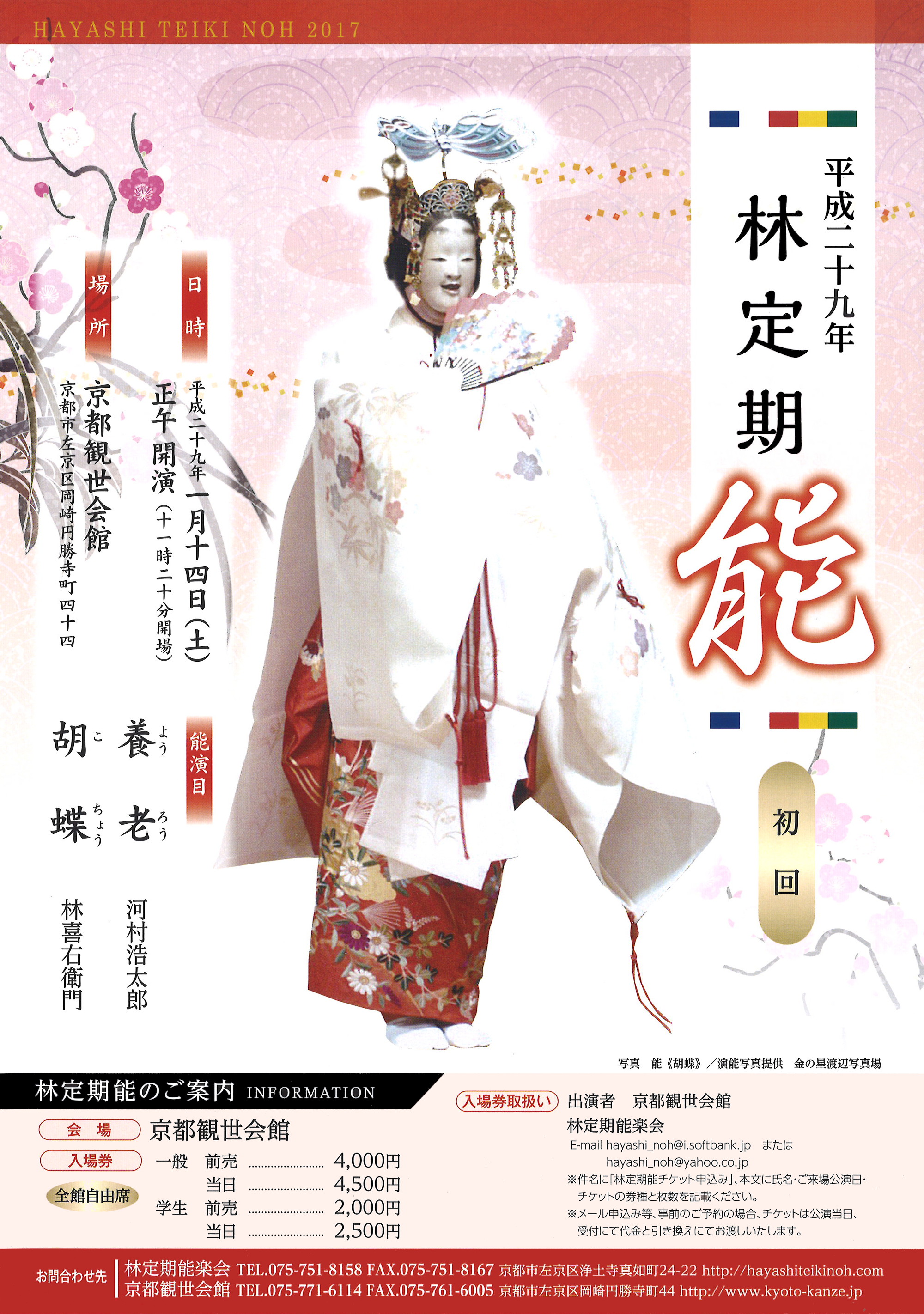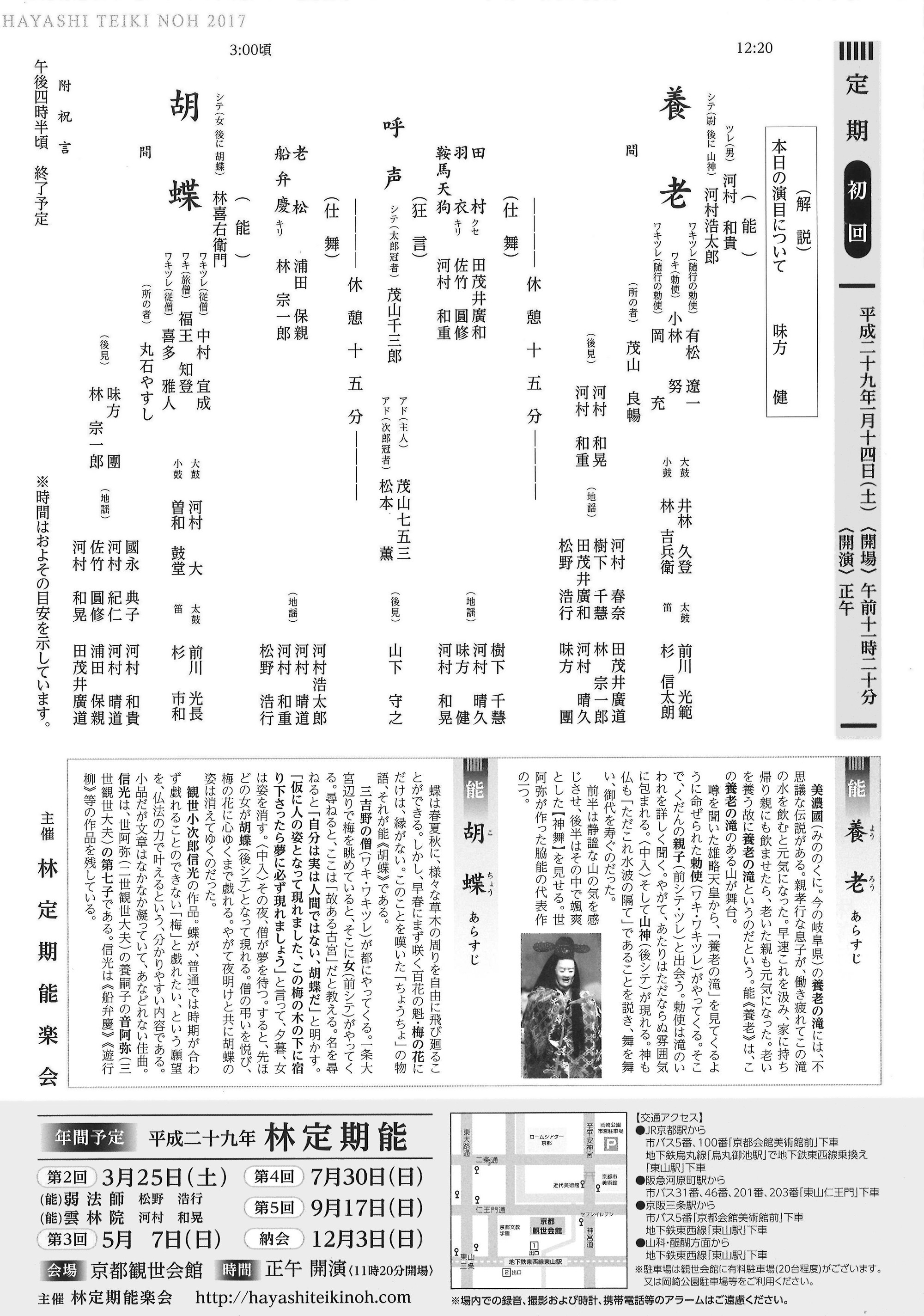林定期能初回 Hayashi Teiki Noh (The First Perfomance of the year)
2017年 1月 14日 (土) 12:00開演(開場11:20)
- 演目
-
能「養老」
Noh "Yourou"
シテ:河村浩太郎
Shite: Koutarou Kawamura
狂言「呼声」 Kyogen "Yobigoe"シテ(太郎冠者):茂山千三郎
Shite: Senzaburo Shigeyama
能「胡蝶」 Noh "Kochou"シテ:林喜右衛門
Shite: Kiemon Hayashi
- 料金
- 一般前売¥4,000 一般当日¥4,500 学生前売り¥2,000 学生当日¥2,500 Advance ¥4,000 At the Door ¥4,500 Students Advance ¥2,000 Students At the Door ¥2,500
・林宗一郎は仕舞「船弁慶」、能「胡蝶」後見にての出演となります。
Soichiro Hayashi will perform as "Shimai" in "Funabenkei" and as "Koken" in Noh "Kochou". ・All seats are general admission.
・The performance is scheduled to end at 4:30p.m.
・Those who order tickets online will receive the tickets on the day of performance, so please give your name and say you have the tickets on hold at the reception desk. You can enter the theatre after paying the ticket fee.
能「養老」
鎌倉時代の説話集「十訓抄(じっきんしょう)」などに掲載されている養老の滝伝説を基にした世阿弥作の脇能物。
美濃国で霊泉が湧き出たと聞いた雄略天皇が勅使を派遣する。
勅使は当地に下り、霊泉に「養老」と名付けた親子(シテ・ツレ)に会う。そのいわれをたずねると、その水を飲むと身も心も癒え、老いた父を養い喜ばせたとの事、親孝行の報いとしてこの滝の霊水を授けられたといって勅使を泉へと案内する。さらに老人は長寿と水にまつわる故事を引き、その水を讃える。すると、滝の周囲に楽の音が聞こえ、花が空より降りただならぬ様子となる。
やがて山神(後シテ)が現れ、泰平の御世を讃え、神舞を舞い天上へと帰って行く。薬の水(霊水)とは酒の事であり、そのめでたさと霊泉への信仰を中心においたおめでたい演目である。
*脇能物
能の演目を内容別に分けた時に、神を主役とし、天下泰平を寿ぐ能の演目の事。内容別に分けるとは、主にシテの役柄についての事であり、他に「男、女、狂(きょう)、鬼(き)」がありこれらを総称して「五番立」ともいう。
能「胡蝶」
胡蝶とは蝶々のこと。蝶は早春に咲く梅花に縁がない。この事を嘆いた蝶の「梅と戯れたい」という願望を、仏法の力で叶えるという早春らしい演目である。
旅僧(ワキ)が吉野から都へ出て一条大宮あたりに梅が今を盛りと咲いているのを眺めていると、都の女(前シテ)がやってくる。シテはその梅のいわれを語り、自分は実は胡蝶であると語る。そして「この梅の木の下に宿り下さったら夢に必ず現れましょう」と言って姿を消す。その夜僧が読誦していると、胡蝶の精(後シテ)が僧の夢の中に現れ、法華経の功徳によって梅の花への執着も消えたと、梅に戯れる喜びを舞う。こうして胡蝶は歌舞の菩薩の面影を残し、明け方の春霞に紛れて消えていく。 Noh "Yourou"
This is a Waki Noh-Mono* written by Zeami based on the legend of Yourou Waterfalls listed in Jikkinshou, a collection of stories from the Kamakura Period (the end of the 12th century to the mid 14th century). The Emperor Yuryaku, who heard that a miraculous fountain has sprung up in Mino Province, sends an imperial messenger. The messenger descends to the place and meets an old man and his son (Shite・Tsure) who named the miraculous fountain "Yourou." The messenger asks the reason for it and they say the old man was healed both physically and mentally after drinking the water from the fountain and that made him pleased. The son also tells the messenger he was bestowed this wonder-working fountain because he took good care of his father and he guides the messenger to the fountain. Furthermore, the old man cites the proverb related to longevity and water and praises the water. Then, a sound of music starts around the waterfall and the flowers start falling down from the sky and the extraordinary atmosphere surrounds the area. Before long, Yamagami, a god of a mountain, (Ato Shite) appears and praises the peace reign of the emperor and goes back to heaven dancing along with Shinto music. The healing water means sake, and this is a celebrational performance featuring the joy and the devotion to the miraculous fountain.
.* Waki Noh-Mono
When Noh-plays are categorized depending on the plot, this is the one featuring God and celebrates the peace that reigns in the country. By categorizing depending on the plot, it is about the role of Shite. There are also “Man, Woman, Maniac, Demon” and these are collectively called “Gobandate”.
Noh "Kochou"
Kochou means butterflies. Butterflies have no luck with plum blossoms that bloom in early spring. This is a piece for early spring that make the butterflies’ (who deplore their fate and desires to play with with plum blossoms) wish come true by using the Buddhism power. A priest (Waki) comes to Kyoto from Yoshino and an urban lady (Mae Shite) comes to him while he is viewing the plums blossoming in all their glory around Ichijo Ohmiya. Shite tells a legend of the plum and also reveals she is actually a butterfly. Then she disappears saying "If you stay over a night under this plum tree, I will definitely appear in your dream." While the priest recites the sutra that night, a spirit of the butterfly (Ato Shite) appears in the priest's dream and says her obsession toward the plum blossoms vanished thanks to the blessing of the Lotus sutra and she dances the joy of playing with plums. Thus, Kochou, the buttterfly, leaves the impression of the Bodhisattva of songs and dance and disappears in the spring haze at dawn.





